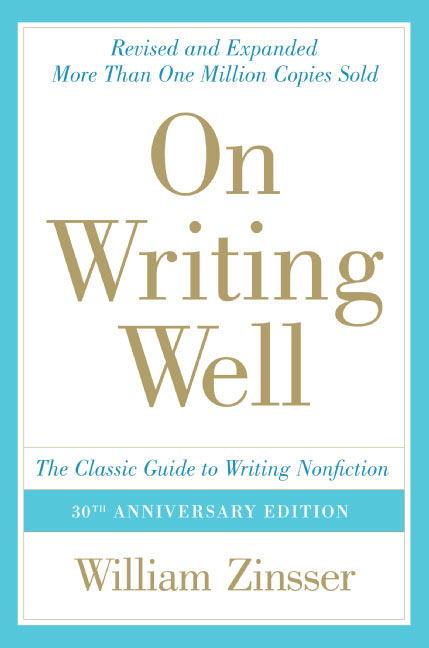William Zinsser died on May 12 in his home in New York City at the age of 92. Zinsser was one the best writing teachers I never had — thanks to “On Writing Well,” his classic guide to writing nonfiction (that’s also the book’s tagline). On the occasion of his passing, I’m sharing this post that I wrote a while back about my favorite advice from his book. – Michelle
It had been a while since I read William Zinsser’s classic guide to writing, On Writing Well.
I grabbed it off my bookshelf to share at a writing class I was teaching as part of a Portland digital journalism weekend, then took it with me on vacation.
I own the book’s fifth edition, which came out in 1994. The only thing about it that’s dated is a discussion of the advantage of writing on a computer v. in longhand and a few references to long-dead writers you may or may not have ever read. The latest edition, the seventh overall, came out in 2006.
Despite its age, On Writing Well is still relevant as a reference for what to do and what to avoid in many forms of nonfiction: newspaper and magazine articles, travel, sports and humor writing, criticism, memoir, even memos, newsletters and emails you may need to produce for work.
Zinsser’s advice to write tight and bright is especially relevant in a world of shrinking word counts and Internet readers who can’t be bothered to scroll past a story’s opening screen.
If you don’t already have this on your bookshelf, get a copy.
Until then, here’s some of my favorite Zinsser advice:
1. On words
Read your articles out loud to see how they flow. Don’t use words you wouldn’t use in the course of normal conversation. Avoid jargon and cliches. Less is more. Active v. passive.
2. On the writing process
Writing is hard, even for the pros, the more you do it, the (slightly) easier it gets. Writing is rewriting. Being a writer isn’t about being a certain type of person, it’s about doing the work.
3. On style
Style is sounding like you on the page, not like anyone else. Zinsser writes:
Sell yourself, and your subject will exert its own appeal. Believe in your own identity and your own opinions. Proceed with confidence, generating it by willpower. Writing is an act of ego, and you might as well admit it. Use its energy to keep yourself going.
4. On interviews
Write questions out beforehand. Use some form of shorthand to take notes even if you’re recording. Get more material than you think you’ll need. Pay attention to detail. I didn’t realize how much of this I’d absorbed until I read his chapter on interviews then looked at the notes I’d made for that Digital Journalism Camp class on conducting interviews – his influence is obvious.
5. On leads and endings
If the first line of your story doesn’t grab readers, they’ll never read the second. Hook them with the lead and keep the good stuff coming. Even when you’re writing nonfiction, writing has to be entertaining for people to stick around. Pay attention to how you finish things. Don’t just re-state the lead – circle back to an opening anecdote, close with a bang-up quote, or simply finish telling the story.
6. On science, technology and other complex subjects
Make sure you understand how what you’re writing about works or you’ll never be able to explain it to readers. Avoid jargon. Include people to keep things real.
7. On editors
Good ones can make decent stories better, and decent writers better too. Bad ones drive writers crazy, by changing style, voice, content, organization, and generally treating them “like hired help.”
8. On freelancing
Some of his closing words could serve as a freelance writer’s anthem:
…The purposes that writers serve must be their own. What you write is yours and nobody else’s. Take your talent as far as you can and guard it with your life. Only you know how far that is: no editor knows. Writing well means believing in your writing and believing in yourself, taking risks, daring to be different, pushing yourself to excel. You will write only as well as you make yourself write.

It’s been a while since I read Zinsser. (College writing class circa 1988-89.) I agree, though, that his book is a classic. Somebody else just mentioned this a couple weeks ago and I’ve been thinking about rereading mine … and now I think I REALLY have to!
Never studied journalism/ writing — or English, for that matter, got credit by exam — at university, so I came to this book later, and was interested to see that there were a lot of aspects I had picked up on my own, through studying the arts.
The last quote you offer is great, but I think a bit differently about his view on style. I’d say good writing is a matter of both confidence and humility rather than ego.
Kerry: I think in the quote, and the section on style, Zinsser uses “ego” to mean sense of self rather than inflated sense of self; given that, I agree with him that style is about letting the real you shine through.
Michelle
Good stuff and excerpts/summary much appreciated. Have been looking for a read just like this.
Marshall, if you like this, I’d also suggest William Blundell’s The Art and Craft of Feature Writing – another classic. Blundell was a writing coach at the WSJ and this book first came out in 1986 – not sure if it’s still in print, you could try for used copies at Powell’s.
Michelle
I re-read this book every year. Wish more marketing/PR pros would read it 🙁
Funny to come across you mentioning this book today – my daughter has to read it now as a high school junior, which I think is a great idea.